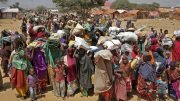Minister of Foreign Affairs Børge Brende announced today that Norway will provide NOK 729 million in aid to north-eastern Nigeria and the Lake Chad region in 2017.
This area has been hard hit by Boko Haram’s campaign of terror, poverty, lack of development and climate change.
Today Mr Brende opened an international donor conference in Oslo for Nigeria and the Lake Chad region, where 11 million people are in acute need of emergency aid.
‘We urgently need to put an end to this crisis. It is affecting an area with a population of 26 million, and is threatening the whole region. Unless we make a concerted effort now, the situation will get even worse, with inevitable consequences. This is why the Government has proposed a three-year commitment to provide up to NOK 1.6 billion in humanitarian and development aid for the period 2017-2019,’ said Mr Brende.
NOK 150 million of Norway’s funding for the crisis for 2017 will be used for food, to protect people who have fled their homes, and for other emergency aid. This humanitarian funding will be channelled through the UN, the International Organization for Migration (IOM), the International Committee of the Red Cross (ICRC), and various Norwegian NGOs in north-eastern Nigeria and the other countries around Lake Chad – Niger, Cameroon and Chad.
‘In addition to emergency aid, it is important to provide long-term support for development efforts. There are areas where basic infrastructure, for example in health and education, is almost non-existent. In our long-term efforts, Norway will build on the development cooperation we have already established with Nigeria and Niger. In Chad and Cameroon, we will focus on supporting the education and health sectors through global funding mechanisms and civil society organisations,’ said Mr Brende.
‘Here in Oslo today, the international community has made an important promise to the people in these crisis-affected areas. This is a question of saving lives, of safeguarding the future for millions of people. The UN will track the humanitarian pledges and disbursed funds, which will contribute to better transparency and accountability for all. In the time ahead, more support will be needed to provide enough food, adequate healthcare, and shelter for all who are in need, as well as for long-term development efforts, especially in the areas of food security and education,’ said Mr Brende.
Mr Brende underlined that it is the affected countries themselves that are responsible for ensuring security and protection, and providing basic services to their populations, and he raised this issue in his meetings with the countries’ foreign ministers. The conference was arranged together with Nigeria, Germany and the UN. Around 170 people from 40 countries, UN and civil society organisations took part.
Source: NTB scanpix / Norway Today




